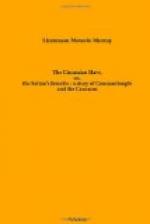“The Sultan will leave no means untried to detect the thief who has stolen his fairest jewel,” said the Armenian, “and his reward will be so rich as to tempt the cupidity of every one, therefore be cautious and trust none.”
“I will not. At midnight to-morrow we must be on board the Petrel, and at the most quiet moment slip her cable and drop quietly down the coast with the night breeze, and if every thing is propitious, we can get well away in the Black Sea before anything will be suspected of us, and pursuit instituted.”
“I shall feel the utmost anxiety until you are fairly away,” said the Armenian.
“We owe much to you,” replied Selim.
Thus saying, the Armenian and Selim entered the cabin together, where Zillah and Komel sat listening to each other’s stories, and fast coming to know each other better and better. Suddenly Komel turned to Selim, and after acknowledging how much she already owed him and the Armenian, said—
“There is one thing I meant to have asked you before.”
“And what is that?”
“Who was it that sang that song beneath the seraglio walls?”
“The same notes that formed our signal to-night?” asked Selim.
“Yes.”
“O, that was a young Circassian, who is on board here,” was the answer.
“But judging from the song he sang, he must be from my native valley.”
“Was it familiar to you?”
“As my mother’s voice,” answered Komel, with feeling. “It is a song that one most dear to me has sung to me many a time, and when a few nights since I heard it, I would have declared that it was his voice again; but I knew him to be gone to a better land; the Sultan took his life, alas! on my own account.”
The Armenian looked at Selim, as much as to say, now for the surprise, while the young officer seemed hesitating as to what he should do next, when a noise was heard at the entrance of the cabin, and in a moment after, he who had steered the boat, slipped within and threw off the outer garment that had muffled him. All eyes were turned upon him as he stood for a moment, when Komel exclaimed, trembling as she said so:
“Is this a miracle, or do my eyes deceive me? that is—is—”
“Aphiz Adegah,” said the Armenian, while an honest tear wet his cheek.
“Komel!” murmured the young mountaineer, as he pressed her trembling form to his breast.
All there knew their story, and could appreciate their feelings, while not a word was spoken, to break the spell of so joyous a meeting, the joy of such unhoped for bliss.
“The Sultan then deceived me,” said Komel, suddenly recovering her voice.
“He was himself deceived, and thinks me dead,” replied Aphiz; “my escape was miraculous.”
“O, let us away at once from here,” said Komel, anxiously; “the Sultan’s agent will surely trace us, and I should die to go back to his harem again. Cannot we go at once?”




